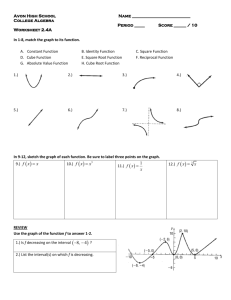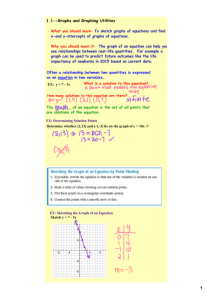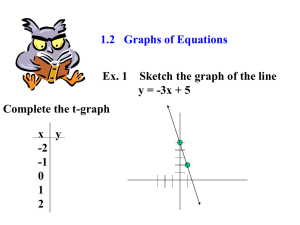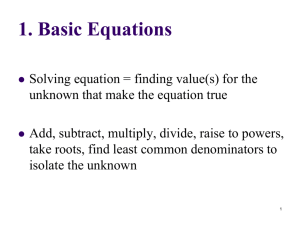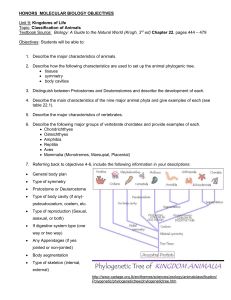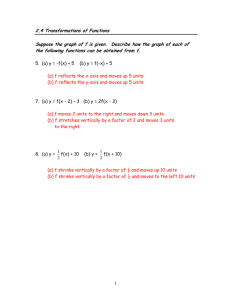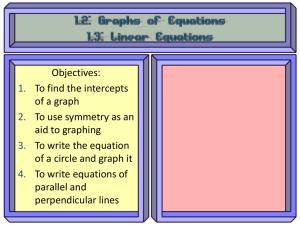Sec 1.1
advertisement
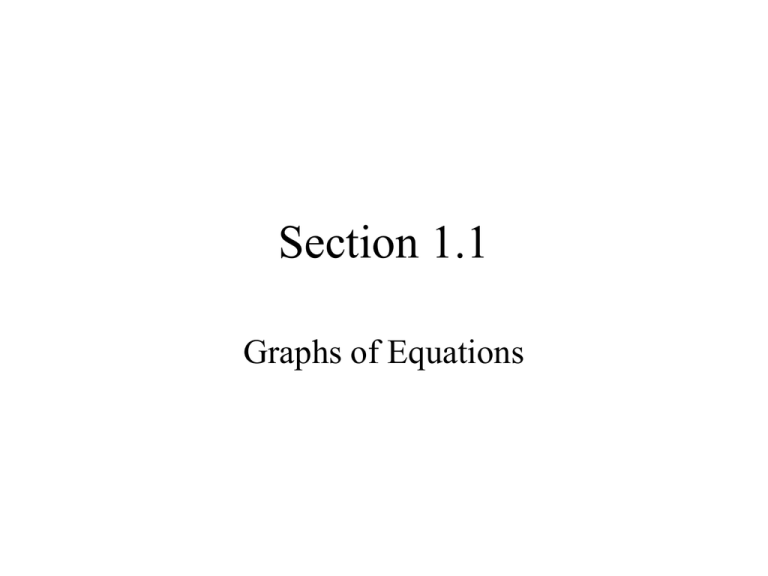
Section 1.1
Graphs of Equations
What you should learn
• How to sketch graphs of equations
• How to find x- and y-intercepts of graphs of
equations
• How to use symmetry to sketch graphs of
equations
• How to find equations and sketch graphs of circles
• How to use graphs of equations in solving real-life
problems
Rectangular
Coordinate System
y-axis
Origin
Quadrants
II
I
III
IV
x-axis
Cartesian
Plane
Graph y = -2x + 1
• (0,1)
• ( -1, 3)
• ( 1, -1)
Example A
Sketch the Graph of an Equation
y 5 2x
0
5
1
3
2
1
3
-1
Calculator
•
•
•
•
•
y 5 2x
[y = ]
Enter y = 5 – 2x
[GRAPH]
[2ND] [TABLE]
Can you get this onto a piece of paper?
Example B
Sketch the Graph of an Equation
y x 5
2
0
-5
4
11
1
-4
-1
-4
2
-1
-2
-1
3
4
-3
4
Calculator
•
•
•
•
•
y x 5
2
[y = ]
Enter y = x^2 – 5
[GRAPH]
[2ND] [TABLE]
Can you get this onto a piece of paper?
8
6
4
2
-5
Intercepts of a
Graph
What can you tell
me about
intercepts?
2
Intercepts of a
Graph
-5
-2
-4
-6
What can you tell
me about
intercepts?
Intercepts of a
Graph
What can you tell me
about intercepts?
4
2
5
Intercepts of a
Graph
8
6
4
2
5
What can you tell me
about intercepts?
(0, y) Finding Intercepts (x, 0)
• To find x-intercepts, let y be
zero and solve the equation
for x.
• To find y-intercepts, let x be
zero and solve the equation
for y.
Example C: Find the x- and yintercepts of :
y 2x 3
4
3
,0
2
2
-5
5
-2
(x, 0)
-4
(0, y)
0,3
Example D: Find the x- and yintercepts of :
y x4
4
4,0 0, 2
2
-5
5
-2
(x, 0)
-4
(0, y)
3,1
5,3
Calculator
•
•
•
•
•
•
y x4
[y = ]
Enter y = (x+4)^.5
Or y = √(x+4)
[GRAPH]
[2ND] [TABLE]
Can you get this onto a piece of paper?
(x, 0)
(0, y)
Example E: Find the x- and yintercepts of :
y 2x 5
4
5
,0
2
2
-5
5
-2
(x, 0)
-4
(0, y)
0,5
3,5
Calculator
y 2x 5
• [y = ]
• Enter y = abs(2x+5)
– To get “abs”
• [math] Select NUM select [1 abs]
• [GRAPH]
• [2ND] [TABLE]
• Can you get this onto a piece of paper?
Example F: Find the xand y-intercepts of : y 2 x3 4 x 2 6 x
0 2 x( x 2 x 3)
0 2 x( x 3)( x 1)
x {0,3, 1}
2
4
2
-5
5
-2
(x, 0)
-4
(0, y)
0, 0 3,0 1, 0
2, 12 1 7
1, 8 2 , 4
Calculator
•
•
•
•
•
y 2x 4x 6x
3
2
[y = ]
Enter y = 2x^3– 4x^2 –6x
[GRAPH]
[2ND] [TABLE]
Can you get this onto a piece of paper?
3 Flavors of Symmetry
• X – Axis Symmetry
– Fold the x-axis
– (x, y) (x, -y)
• Y – Axis Symmetry
– Fold the y-axis
– (x, y) (-x, y)
• Origin Symmetry
– Spin
– (x, y) (-x, -y)
X – Axis Symmetry
Fold the x-axis
Example B
(x, y) (x, -y)
-5
x y 5
2
4
2
-2
-4
-5
0
11
4
-4
1
-4
-1
-1
2
-1
-2
4
3
4
-3
5
Y – Axis Symmetry
Fold the y-axis
Example B
(x, y) (-x, y)
y x 5
2
4
2
-5
0
-5
4
11
1
-4
-1
-4
2
-1
-2
-1
3
4
-3
4
5
-2
-4
Algebraic Tests for Symmetry
• The graph of an equation is symmetric to
the x-axis if replacing y with –y yields an
equivalent equation.
x y 5
2
x ( y ) 5
2
x y 5
2
Since this is the equation we started with we know that
the relation has x-axis symmetry.
Algebraic Tests for Symmetry
• The graph of an equation is symmetric to
the y-axis if replacing x with –x yields an
equivalent equation.
y x 5x 6 y ( x) 5( x) 6
2
y x 5x 6
2
2
Since this equation is different than what we started
with we know that the relation does not have y-axis
symmetry.
They are symmetrical to each other
but not to themselves.
y x 5x 6
2
y x 5x 6
2
6
6
4
4
2
2
5
-2
-5
-2
#29 y-axis symmetry
#30 x-axis
symmetry
#31. Origin
Symmetry
32. Y-axis
symmetry
a
b
Given:
-Square
-Length a
a
b
Are the
triangles
congruent?
b
a
What type of
quadrilateral is
formed by connecting
the points?
What is the area
of the large
square?
=
b
What is the area
of the small
square?
a
+
What is the area
of all four
triangles?
Pythagorean Theorem
1
2
2
(a b) c 4 ab
2
2
2
2
a 2ab b c 2ab
2ab
2ab
a b c
2
What is the area
of the large
square?
2
=
a
b
a
b
(a+b)2
b
a
2
What is the area
of the small
square?
b
+
a
What is the area
of all four
triangles?
Distance Formula
(
6
a b c
2
2
2
) (
) d
( x, y )
2
2
2
4
( h, k )
2
B
5
(
-2
) (
2
) d
2
2
a b c
2
Circle
2
5
-2
-4
2
• What is
the radius?
• What is a
circle?
4
-5
2
x y r
2
2
2
a b c
2
Standard form of the Equation of a Circle
2
) (
) d
2
(
2
2
2
6
(7,5)
4
(3, 2)
2
B
5
( x h) ( y k ) r
2
-2
(
) (
2
2
2
) ( )
2
2
Homework
1-31 odd, 57-71 odd 76
